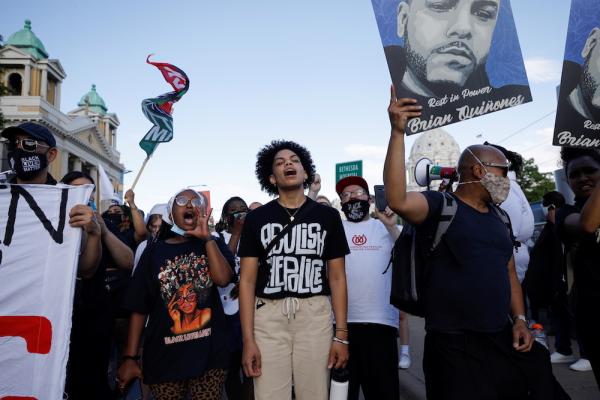I recently spoke with a good friend who was in the gospel choir with me at Clemson University. He sang. I played drums. During our time there — in between meals and practice and concerts — we felt the suffocation. That suffocation was in between the Black gospel choir and white Fellowship of Christian Athletes meetings, between Black Clemson and white classes. It was not the type of suffocation that kills you; it was the kind that smiles in your face and puts arms around your shoulders and waves hands in praise and sways your body side to side while never getting rid of slaveholding names and memories and theologies. It was the type of suffocation that enjoys the feeling of your presence but fails to embrace the fullness of your humanity.
“I just feel like Black people always have to be migrating,” my friend said. “We’re always forced to have to move to feel safe and seen.” I agreed. “Like Black Clemson, Black gospel,” I said, “that was congregating.” That was exhale, release, love, shouts, hallelujahs — and us. That was what we knew we needed in the moment. It was not about specialness, or theories and theorizing; it was about being human, and being loved, and being together, and being seen.
Before our conversation, the verdict for the Derek Chauvin trial came down. Guilty. I was in my office that day.
I couldn’t watch it. I thought about how hard it is and still remains to remember seeing George beg for his life, and for his momma, as his neck was being kneeled on and his body was being filmed. Then minutes later: no breath, no tears, no cries, no mommas, and no begging.
How do you watch and remember something so depressing and so terrible and so harmful to the psyche? How do we find ways to live and to love in a country that has an insatiable desire for our death and our suffering?
I don’t know the answers to those questions right now. I just know that I’m still struggling to remember and cry and hope because I want so much more for us now — not in some future. I want Black wins now. I want to see us live now. I want mothers and fathers and sisters and brothers and cousins and lovers and friends to know what it means to exist in a place that is as concerned about our joy as it is about our freedom. I don’t want us to have to be killed three times: bodies, names, and verdicts.
When the Amber Guyger trial happened a few years ago, it took something out of me. Around the time of the verdict, we were in California. On my morning run, a white man took pictures of me, asked me what I was doing on the sidewalk, and told me I didn’t belong there. A death happened inside of me.
I remember that death in my body. I remember returning home and looking at myself in the mirror and trying to feel human and loved. At the time, I was deeply invested in the trial. It consumed me. I wanted so much for Botham Jean and his family. I remember Guyger’s tears — I hated them with everything inside of me because I knew white tears often mean Black losses. I remember the arguments for her innocence. Then the verdict came: guilty. I thought I was going to feel relieved but I wasn’t.
We had still been robbed. I heard people use words for Guyger rarely used for us: “That’s too harsh”; “He [Botham] would turn the other cheek”; “She should get a lighter sentence.” I cannot forget and will not forget what my body felt when it all happened. It felt the same way when the white man disrespected me and when I saw Derek Chauvin kneel on Floyd’s neck and when I saw Alton Sterling’s body on the concrete and when I see police officers use tear gas and rubber bullets on young people. I never want to feel it again.
So now today, on the anniversary of George Floyd’s murder, when another Black name is tied to white hatred, and we are forced to be resilient in ways we never should have been forced, I am struggling. I don’t want to remember. I don’t want to hashtag. I don’t want to feel. I just want us to win and live and play, and be free.
But I’m reminded of something theologian M. Shawn Copeland wrote: “So they love, but never uncritically; they did not allow pain to numb the struggle for freedom.”
I can’t be numb. I must feel. I must say George Floyd’s name. I must love us. I must embrace us. I must protect us. I must do what I can to liberate this country from its hatred.
If George and Breonna and Ahmaud and Daunte and Alton and Rayshard and Daniel and Atatiana and Botham and so many more are worth remembering, then their loss is worth feeling. I feel their loss and I feel the pain, but I refuse to force myself to engage in a system committed to Black losses.
I hope we are all being kind to ourselves and holding one another as we wait for something better. “Let justice roll down,” the prophet Amos wrote. I don’t know if we will be there to see the rolling but we are here and we can remember that we are worthy of the deepest love.
“Aye bruh,” I said to my friend before hanging up, “next week?” “Yeah, next week,” he said. “Love you, bruh,” I said. “Love you too, bruh.”
We talked.
We laughed.
We were vulnerable.
We were not ashamed.
We knew resilience.
We congregated.
We ain’t saved, but at least we’re here.
Got something to say about what you're reading? We value your feedback!







